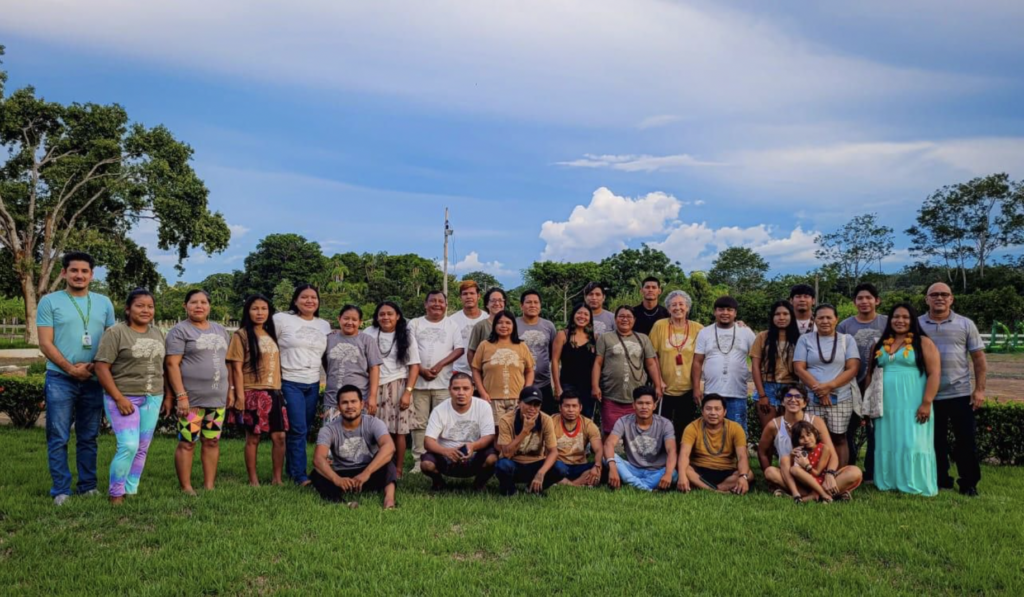
Celebrating Forest Trends’ Indigenous Territorial Governance Training Program in Climate Finance.
September 19, 2024
By Beto Borges, Director of Forest Trends’ Communities and Territorial Governance Initiative. Forest Trends is a founding coalition member of Equitable Earth.
Indigenous Peoples are at the forefront of combating the climate crisis, yet they have limited access to crucial funding for this cause. While international donors increasingly recognize the importance of supporting Indigenous-led climate solutions, existing mechanisms like Jurisdictional REDD+ and the voluntary carbon market remain complex and challenging for Indigenous communities to navigate and benefit from.
To support Indigenous communities in their negotiations and enhance their influence on government decisions, it is vital that they have access to clear, timely, and accessible information. Unfortunately, much of the available information is highly technical, often highlighting the benefits without adequately addressing the associated risks.
These risks to Indigenous Peoples and Local Communities include: if proper safeguards are not in place, carbon projects and jurisdictional REDD+ programs could lead to land rights violations, unfair distribution of benefits, and the erosion of Indigenous peoples’ and local communities’ cultural and environmental practices.
In response to this need, Forest Trends’ Communities and Territorial Governance Initiative adapted their Indigenous Territorial Governance Training Program (PFGTI) to focus on climate change and climate finance.
The final in-person module of the program took place from September 1-8, 2024, in Rondônia, Brazil, with 32 Indigenous participants – including members of the Kwazá, Suruí, and Makarup. The program’s goals are to strengthen local communities’ skills in territorial governance, climate change adaptation, and environmental impact mitigation.
Local Indigenous participant Abner Suruí from the Sete de Setembro Indigenous Land had this to say after graduating from the program:
“The course was very important for us Indigenous Peoples who participated from each territory and each ethnicity, to understand climate change and climate finance at this time when we are living with smoke and other negative environmental impacts. We learned deeply with high-quality professors. Each person also took back to their territory knowledge about climate mitigation and how to adapt. This is a great responsibility for Indigenous Peoples because we are the guardians and defenders of the forest, keeping it standing. This motivates us greatly, and now each of us is prepared for whatever comes!”
As the program concluded, participants showcased community-based practices and activities they developed during the course. On the final day, a craft fair, seed exchange, and graduation ceremony were held to celebrate their accomplishments. Through this training, the region’s Indigenous communities are now better equipped to make informed decisions and seize opportunities in climate finance while navigating its risks.
Additional quotes from the program’s Indigenous graduates:
“I didn’t understand REDD+ before. We saw it as something dangerous. Now, after taking the course, I understand that it’s not dangerous. It’s to prepare us for what may come. To understand and deepen our knowledge. I found it amazing!”
– Helenice Aikanã Kwazá from the Kwazá Indigenous Land of the São Pedro River.
“We are one of the important pieces in climate change. How valuable is our forest? How do we have the power to work on this? This [training program] was very important for us because we still have our forest standing.”
– Lana Suruí from the Sete de Setembro Indigenous Land.
“The course gave me knowledge that I didn’t have before, especially about how to deal with climate change currently. I suggest more of this training, especially in the Rio Guaporé Indigenous Land, where people don’t have much knowledge about climate change.”
– Rivaldo Makurap from the Rio Guaporé Indigenous Land.
This effort is made possible through financial support from the Climate and Land Use Alliance and key partnerships with local organizations such as GreenData, the Federal University of Rondônia (UNIR), the Indigenous Youth Movement of Rondônia (MJIR), and the Indigenous Women’s Association of Rondônia (AGIR).
As a founding coalition member of Equitable Earth, Forest Trends’ role in the organization is to deploy their experience in capacity building for the Indigenous Peoples and Local Communities that Equitable Earth invests in and supports.